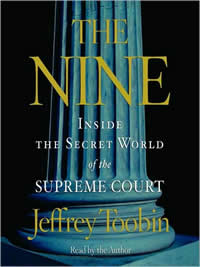Book Notes
 Jeffrey Toobin, The Nine; Inside the Secret World of the Supreme Court (New York: Anchor Books, 2007), 452pp.
Jeffrey Toobin, The Nine; Inside the Secret World of the Supreme Court (New York: Anchor Books, 2007), 452pp.
Jeffrey Toobin's book has garnered a dozen "book of the year" awards for his description of the life, work and, especially, the power of partisan ideology inside the highest court of the land. Toobin, a graduate of Harvard law school and author of numerous books, combines his own knowledge of the legal land with extensive interviews with all the justices and seventy-five of their clerks to craft a genuine page-turner. But he has an agenda beyond mere description.
What we've witnessed since the beginning of the Reagan years and the founding of the Federalist Society in 1980, says Toobin, is nothing less than a powerful and dramatic "counter-revolution" of conservative political ideology on the court. This movement has been fueled by right wing Republicans, white evangelicals like James Dobson, and political operatives at all levels. They are unapologetic and crystal clear about their agenda: "Expand executive power. End racial preferences intended to assist African Americans. Speed executions. Welcome religion into the public sphere. And, above all, reverse Roe v. Wade and allow states to ban abortion," abortion being what Toobin calls the "defining subject" and "central legal issue before the court." With the recent appointments of John Roberts and Samuel Alito, joined by Scalia, Thomas, and (usually) Kennedy, the goals of this conservative takeover are now "tantalizingly within reach." Sotomayor's appointment solidified Souter's liberal leanings, but Ginsburg (age seventy-six) has pancreatic cancer and Stevens is almost ninety.
Contrary to what John Roberts claims, justices are hardly neutral arbiters of our legal business, or umpires merely calling balls and strikes. It's a "magnificent illusion," writes Toobin, to think that the justices "operate at a higher plane than mortals who toil on the ground." No, what drives their decisions is not mere intelligence or legal skill, but personal ideology, partisan politics, and judicial philosophy. What matters, then, "is not the quality of the arguments but the identity of the justices." Our Constitution does not have an obvious meaning, but is instead subject to wide varieties of interpretations. The current polarizations dismay many, Toobin admits, and the hope for a "middle ground" where the law becomes obvious and clear dies hard; but that's ultimately a "false hope." Like the president and the congress, our justices are very much part of our inherently political process and so, in the end, we the people choose our justices by the way we vote.


